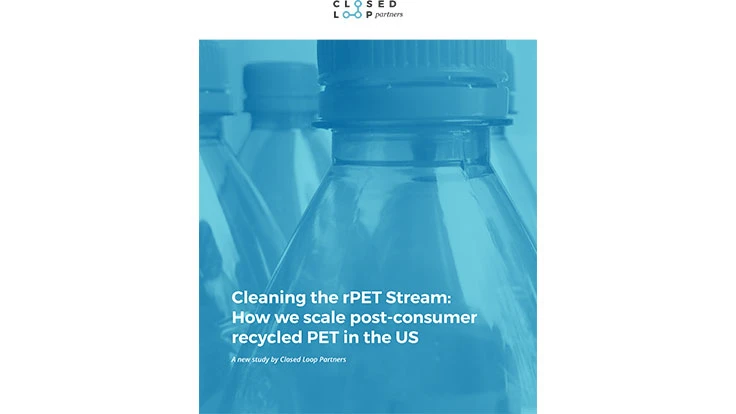
Closed Loop Partners, New York, has released “Cleaning the rPET Stream,” a new study looking at recycling system interventions that the organization says could increase the recycling rate for polyethylene terephthalate (PET) by 6 percent and close the loop on an additional 80 million pounds of PET bottles annually without the introduction of new recycling carts.
The full report, including a detailed analysis of recommended interventions, is available on Closed Loop Partners’ website at www.closedlooppartners.com/cleaning-the-rpet-stream.
Focusing on U.S. infrastructure for sorting and processing postconsumer recycled PET (rPET) for bottle and container uses, the study looked at cost drivers for producing rPET, including high levels of contamination and yield loss commonly found in curbside PET bales.
Closed Loop Partners Managing Partner Ron Gonen says, “We commissioned this study to identify systemwide opportunities to improve current rPET infrastructure and scale the use of postconsumer recycled PET nationally. We believe there are investable opportunities that benefit municipalities, the PET recycling industry and end users by making rPET a more desirable material that competes with virgin.”
The study arrived at a number of findings:
- Although rPET pricing is closely tied to that of virgin PET, the cost structures for producing each are very different. Processing rPET is a highly distributed, mechanical process, involving policy-driven supply and market-based demand that must compete with virgin resin markets.
- Recommended interventions include making capital investments in newer technologies at material recovery facilities (MRFs) and at reprocessors, improving packaging design for recyclability and creating more reliable agreements among parties.
- If interventions are implemented together, MRFs, reprocessors and end users could lower costs by 10 percent, improve yield by 21 percent and create other system benefits.
- If the suggested interventions were implemented at scale, the national recycling rate of PET could increase by 6 percent.
- Opportunities are available to create value throughout the supply chain and can be instructive for considering solutions for polypropylene (PP) and polyethylene (PE), two resins that are seeing growth in volumes and end-use markets.
Closed Loop Partners says that if its suggested systemwide interventions were implemented, “the result would be a stronger system, more resilient in riding out the storms. We would also see a reversal of the recent negative trends in PET recycling rates, with meaningful increases in the quantity and quality of PET going through the system.”
Research and analysis for “Cleaning the rPET Stream” was provided by Ann Arbor, Michigan-based RRS, with input from the Association of Plastics Recyclers (APR), Washington, and NAPCOR, Florence, Kentucky. The study was commissioned as part of Closed Loop Partners’ broader research initiative to provide insights to investors on the capital landscape for recycling and circular supply chains.
Nelson Switzer, chief sustainability officer for Nestlé Waters North America, which is an investor in Closed Loop Fund and a member of APR, says, “The study identifies a set of levers that can be pulled to clear the way for brand owners to make the additional investment in the use of rPET. If the right combination of these levers can be pulled, costs for rPET will decline and use will increase—a win-win for the environment and the economy.”
Get curated news on YOUR industry.
Enter your email to receive our newsletters.
Latest from Recycling Today
- ReMA board to consider changes to residential dual-, single-stream MRF specifications
- Trump’s ‘liberation day’ results in retaliatory tariffs
- Commentary: Waste, CPG industries must lean into data to make sustainable packaging a reality
- DPI acquires Concept Plastics Co.
- Stadler develops second Republic Services Polymer Center
- Japanese scrap can feed its EAF sector, study finds
- IRG cancels plans for Pennsylvania PRF
- WIH Resource Group celebrates 20th anniversary






